Ukraine-Russia war: Ukraine accused of attack on Russian soil ’
Moscow has accused the Ukraine of a strike on Russian soil, it says could derail peace talks between the two parties.
World
Don't miss out on the headlines from World. Followed categories will be added to My News.
Moscow has accused the Ukraine of a strike on Russia soil, it says could derail peace talks between the two parties.
Russia claimed overnight that Ukranian helicopters blew up an oil depot in Belgorod, a small city around 40 km north of the border with Ukraine.
If true, it would mark the first time Ukraine forces have attacked inside Russia since the conflict began more than a month ago.
However Ukraine has denied the accusation.
Video footage showed firefighters attempting to get the massive blaze under control as giant plumes of black smoke billowed into the air as an inferno raged below.
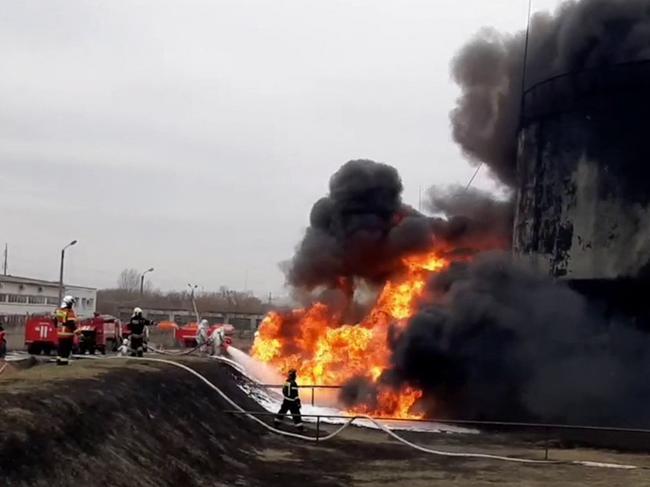
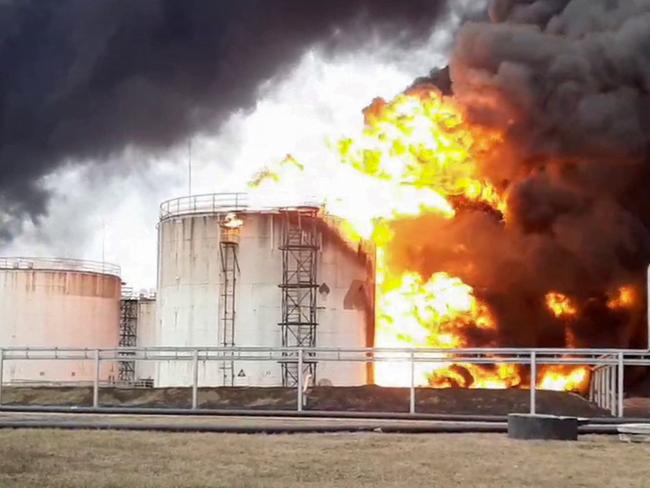
Belgorod governor Vyacheslav Gladkov said Ukraine forces attacked the facility, a claim that was backed up by Russian defence ministry spokesman Igor Konashenkov.
According to the Russians version of events, around 5am Moscow time, two Ukranian Mi-24 helicopters - known as ‘flying tanks’ entered Russian airspace at a very low altitude to “launch a missile attack on a civilian oil storage facility”.
“The oil storage facility has nothing to do with the Russian armed forces,” Mr Konashenkov said.
Russian state media reported that residents close to the oil depot had to be evacuated and that two people at the depot were injured. It claimed eight fuel tanks were on fire and around 200 firefighters were called upon to fight the blaze.
President Vladimir Putin’s spokesman Dmitry Peskov said the reported incident “cannot be perceived as creating comfortable conditions for continuing the talks” with Kyiv.
Ukraine claimed it had nothing to do with the incident.
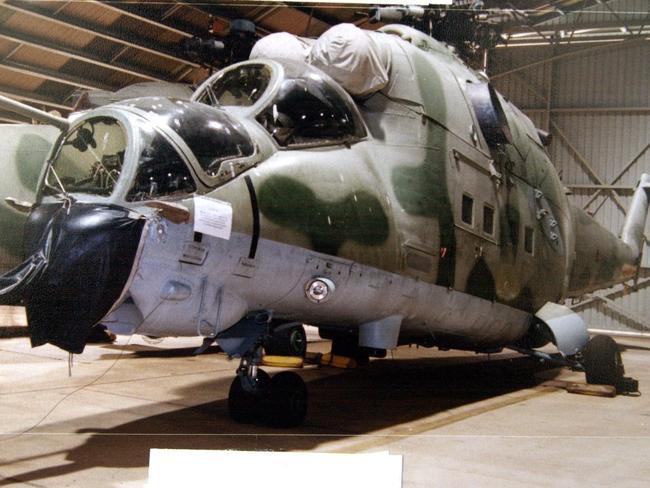
“For some reason, they are saying we are behind it. This does not correspond to reality,” Ukraine security council secretary Oleksiy Danilov said.
Ukrainian defence ministry spokesman Oleksandr Motuzyanyk said his forces were resisting Russia inside Ukraine but were not taking the war beyond their borders.
“It does not mean that Ukraine has to bear responsibility for all those catastrophes and all those events that happen on the territory of the Russian Federation,” he said, according to the BBC.
“This is not the first time we have seen such accusations. So, dear friends, I will neither confirm nor deny this information.”
The claims and counterclaims came as Ukrainian President Volodymyr Zelenskyy said 3000 people had been rescued from besieged Mariupol.
‘WEAK’ PUTIN’S INVASION ‘FALLING APART’
Russia’s bid to take all of Ukraine during its invasion looks to have “fallen apart” as its President, Vladimir Putin, is “weaker and more diminished figure today” than he was before, claims a British military chief.
In a speech and follow-on question-and-answer session at an Institute for Government (IfG) event, the Chief of the Defence Staff, Admiral Sir Tony Radakin, said Mr Putin was a “weaker and more diminished figure today” than he was before the invasion started on February 24.
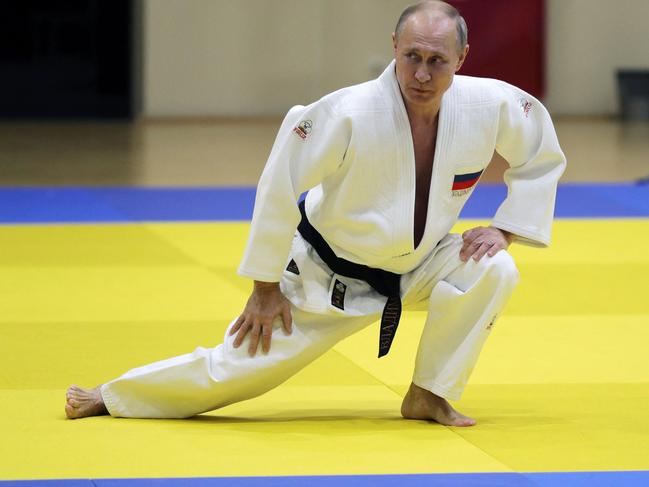
Mr Radakin said the UK was “incredibly cautious” about believing Russian claims, adding: “I think we are seeing that Russia’s ambitions to take Kyiv and Russia’s ambitions to take the whole of Ukraine, and do that in a very swift and impressive fashion, those ambitions have fallen apart.
“And it looks now that less emphasis is being placed on Kyiv and more emphasis is being placed on the east and the south.
“We are starting to see the early indications of those forces being moved back from Kyiv and retreating to both Russia and Belarus.
“That in itself is a difficult evolution for Russia because they are doing that under contact, so Ukraine armed forces will attack those Russian forces as they retreat.”
It comes as rumours continued to swirl about Putin’s health with suggestions that he may suffer from thyroid cancer or Parkinson’s Disease.
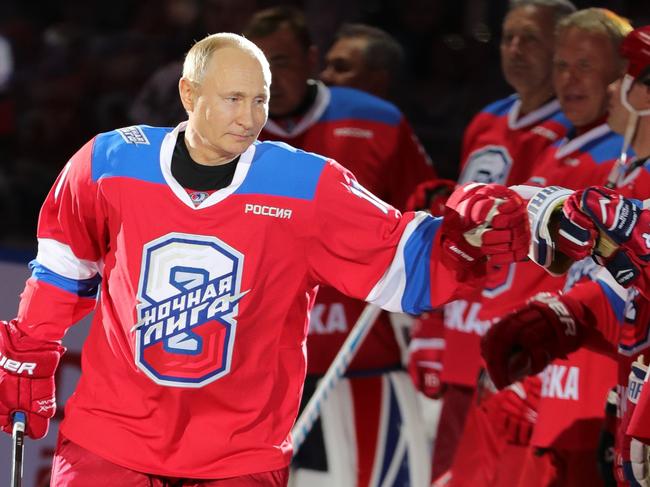
The Russian leader remains tight-lipped about his health but recent public appearances where he seemed “bloated” and “weakened” have sparked rumours about his physical state, reports The Sun.
The appearance of the 69-year-old who has long prided himself on his “strong man” image, has changed dramatically in the past years causing speculation that he may be suffering from a severe physical illness.
And now a new investigation has revealed the tyrant is “constantly” accompanied by a doctor specialising in thyroid cancer.
The report by investigative Proekt media - which is blocked in Russia - states that surgeon Yevgeny Selivanov, of Moscow’s Central Clinical Hospital, has flown to the Russian leader no less than 35 times in the Black Sea resort Sochi.
The respected doctor’s expertise is thyroid cancer.
The discovery backs recent theories that Putin declared war when he was suffering medical problems hidden from the Russian people.
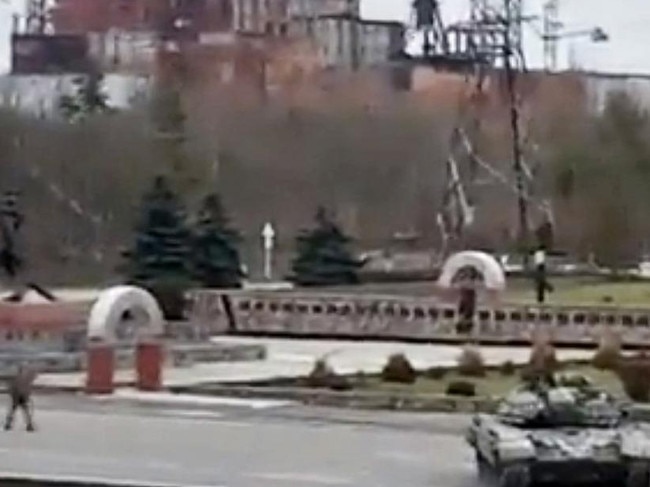
Back in November 2020, political analyst Valery Solovei revealed the cancer and Parkinson’s theory claiming that Putin also needed to have emergency surgery.
He said at the time of Putin’s health issues: “One is of psycho-neurological nature, the other is a cancer problem.
“If anyone is interested in the exact diagnosis, I’m not a doctor, and I have no ethical right to reveal these problems.
“The second diagnosis is a lot, lot more dangerous than the first-named diagnosis as Parkinson’s does not threaten physical state, but just limits public appearances.
“But there is a fatal diagnosis.
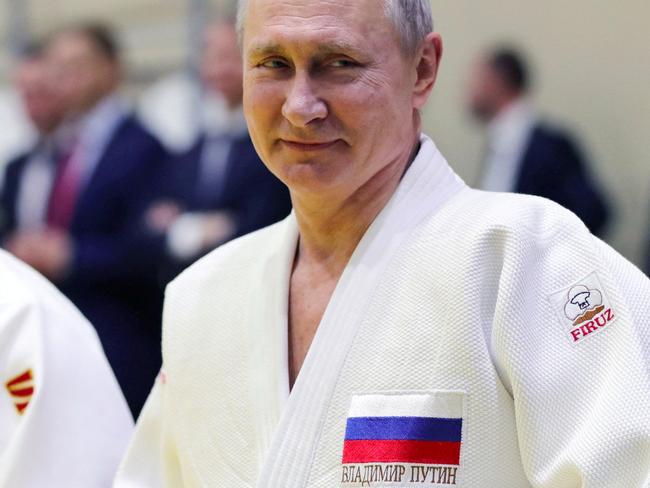
“Based on this information people will be able to make a conclusion about his life horizon, which wouldn’t even require specialist medical education.”
He added that the Russian President had undergone surgery with another source claiming it was an abdominal cancer operation.
Video footage showed Putin’s leg moving constantly and his fingers twitching, backing the Parkinson’s theory.
Putin also suffered a coughing fit during a televised meeting but the claims about his health were disputed by Kremlin.
The report continues to identify medics who regularly travel with Putin on trips, especially in Sochi which he prefers to Moscow.
RUSSIAN SOLDIERS EXPOSED TO CHERNOBYL RADIATION
It also emerged that Russian soldiers were likely exposed to radiation while they were occupying the area around the Chernobyl nuclear power station over the past four weeks, Ukrainian officials said on Friday local time.
Vehicles used by Russian forces would have raised radioactive dust clouds and soldiers also dug trenches in the most contaminated part of the site, Ukraine’s nuclear agency Energoatom said.
The power station, the site of the world’s worst nuclear disaster in 1986, was taken back under the control of Ukrainian forces on Thursday as Russia withdrew from areas north of the capital Kyiv.
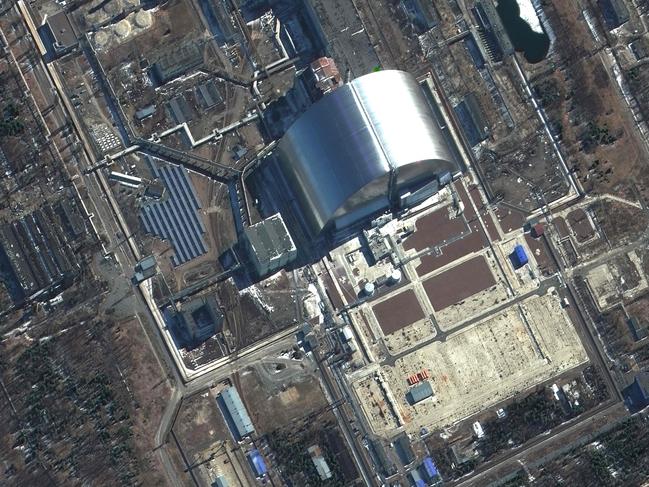
“All the equipment at the Chernobyl power station is functioning. The control and radiation monitoring systems function as usual,” power station chief Valery Seida said in a statement.
But he said the soldiers may have been exposed.
“The thick dust that their vehicles raised into the air and the radioactive particles it contains can easily penetrate into the Russians’ organism through their lungs,” Mr Seida said.
Since they also dug trenches in the area, “it is entirely possible that they have been exposed to considerable levels of radiation,” Energoatom said.
International Atomic Energy Agency (IAEA) director general Rafael Grossi said on Friday the agency had no confirmation of such reports and added that “the general radiation situation around the plant is quite normal”.
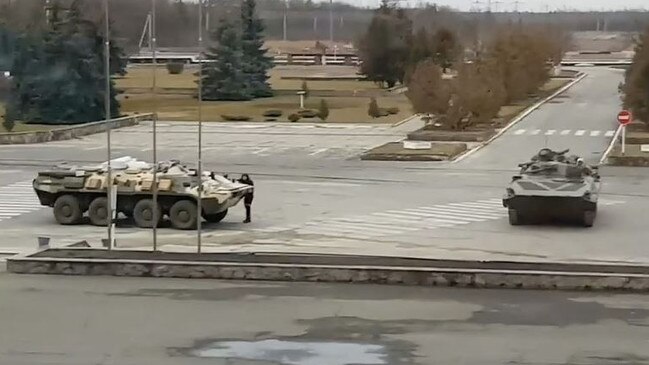
However, he added the Russian withdrawal might have led to higher levels of “localised radiation” due to the movement of heavy vehicles, as was the case when Russia seized the site.
On Thursday the agency said it was “seeking further information in order to provide an independent assessment” of the reports that troops may have been contaminated.
Speaking to reporters in Vienna after a trip to Ukraine and Russia where he held talks with officials from both sides, Grossi also said the agency had “agreed separately with Russia and with Ukraine” on plans to send assistance missions to Ukrainian nuclear facilities.
Russia’s capture of Chernobyl in the early days of its invasion of Ukraine, which began on February 24, raised worldwide fears over nuclear leaks.
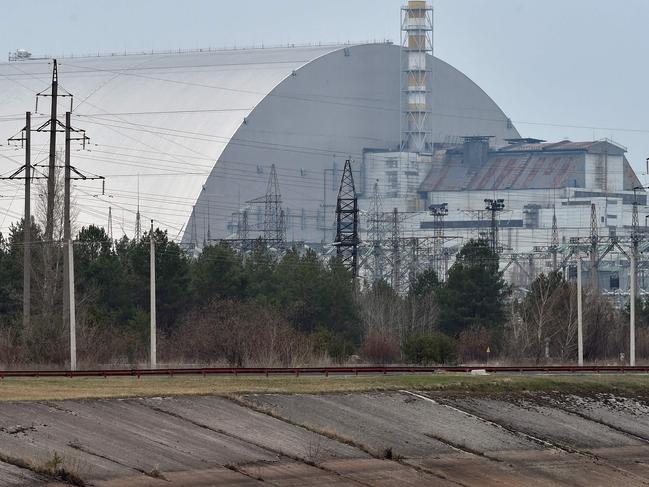
Ukrainian Foreign Minister Dmytro Kuleba told reporters in Warsaw that Russia had shown “irresponsibility” in its actions around Chernobyl.
“Russia showed irresponsibility on all fronts, from its refusal to allow staff at the power station to fully carry out their duties to digging trenches in the contaminated area,” he said.
Chernobyl’s number four reactor exploded in 1986 and is now covered by a double layer of sarcophagus -- the first built by the Soviet Union and another that was only completed in 2019.
The power station’s three other reactors were successively closed down, with the latest shutting off in 2000.
New: Russia claim Ukrainian Mi-24 helicopters carried out an air strike on on a fuel depot in Belgorod, #Russia, near the border with #Ukrainepic.twitter.com/mEcwKZb62W
— Danny Armstrong (@DannyWArmstrong) April 1, 2022
RUSSIA PLANNING ‘POWERFUL STRIKES’
Ukraine’s President Volodymyr Zelenskyy warned Russia is consolidating and preparing “powerful strikes” in the country’s east and south, including besieged Mariupol, where a new attempt will be made Friday to evacuate civilians from the devastated city.
In peace talks this week, Russia said it would scale back attacks on the capital Kyiv and the city of Chernigiv, but Ukrainian and Western officials have dismissed the pledge, saying Moscow’s troops were merely regrouping.
“This is part of their tactics,” said Zelenskyy in a late-night address. “We know that they are moving away from the areas where we are beating them to focus on others that are very important … where it can be difficult for us,” he said.
In particular, he warned, the situation in the country’s south and east was “very difficult”.
“In Donbas and Mariupol, in the Kharkiv direction, the Russian army is accumulating the potential for attacks, powerful attacks,” he said.
Washington echoed that assessment, with a senior US defence official saying Russia’s focus on Donbas could herald a “longer, more prolonged conflict”.
Military experts believe that Moscow is ditching efforts to advance simultaneously along multiple axes in the north, east and south, after struggling to overcome stronger-than-expected Ukrainian resistance.
Instead it wants to establish a long-sought land link between Crimea, which Moscow occupied in 2014, and the two Russian-backed Donbas statelets of Donetsk and Lugansk.
EVACUATION OF MARIUPOL ‘NOT YET CLEAR’
The Red Cross said it was “not yet clear” that the evacuation of civilians from the besieged Ukrainian city of Mariupol would go ahead as planned on Friday.
“We remain hopeful, we are in action moving towards Mariupol … but it’s not yet clear that this will happen today,” Ewan Watson, a spokesman for the International Committee of the Red Cross, told reporters in Geneva, as an ICRC team of three cars and nine staff headed towards the city.
Mariupol is the main remaining obstacle to Russia’s ambition, and Russian forces have encircled and relentlessly bombarded the city to try to capture it.
Instead, it has been reduced to rubble, with tens of thousands of civilians trapped inside with little food, water or medicine.
Previous attempts to evacuate residents have collapsed.
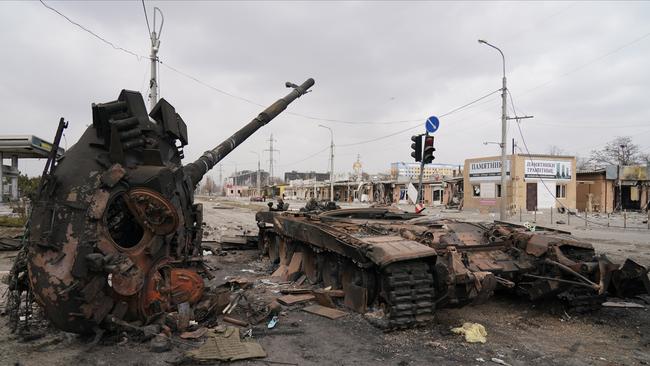
NEW RUSSIAN THREAT TO WEST
Russia has threatened to turn off its gas taps to Europe, opening up a new front in its war in Ukraine.
With his economy crippled by unprecedented international sanctions, Vladimir Putin tried to leverage Russia’s status as an energy power, warning that EU members will need to set up ruble accounts from Friday to pay for Russian gas.
The EU has joined the United States in imposing sanctions, but has stopped short of an energy embargo.
“If such payments are not made, we will consider this a breach of obligations on the part of our buyers” and existing contracts would be stopped, Mr Putin said.
Germany, which before the war began imported 55 per cent of its gas supplies from Russia, insisted it will continue to pay in euros or dollars as stipulated in contracts.
Berlin and Paris were also “preparing” for Russian gas to simply stop flowing, France’s economy minister said.
US President Joe Biden moved to mitigate rising fuel prices by announcing a release from strategic US reserves of a million barrels daily for six months.
It is by far the largest tapping of the stockpiles in US history, and amounts to adding to global supplies by about one per cent.
ZELENSKYY WARNS OF THREAT TO AUSTRALIA
Australia is not safe from the “real threat” of Russian aggression, Ukrainian President Volodymyr Zelenskyy has warned as he pleads for more military assistance to defend his country.
Mr Zelenskyy was heralded as a “lion of democracy” and received multiple standing ovations as he appeared before Australia’s parliament via video link on Thursday to plead for more arms and called for further sanctions against Moscow to end his people’s suffering.
“(Russia is) shelling cities and villages, they’re killing our civilians and children,” he said. “They’re … holding hostages of hundreds of thousands of people in the cities without water and food.”
Mr Zelenskyy acknowledged Australia was far away from Europe, but argued no distance would protect it from the “brutality” of Russian President Vladimir Putin’s regime.
“Whatever is happening in our region … (can) become a real threat to your country and your people as well,” he said.
“Because this is the nature of the evil – it can instantly cross any distance and barriers, destroy lives.”
CLICK HERE TO READ Mr ZELENSKYY’S SPEECH IN FULL
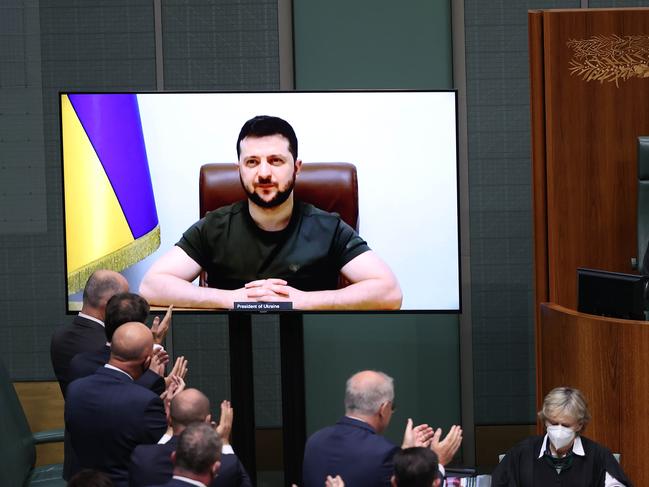
Mr Zelenskyy said Australia’s leadership would be “paramount” in ensuring war criminals were held to account, that economic sanctions against Russia were effective and Ukraine was sufficiently equipped to fight for its freedom.
He said if Russia was not punished it would keep returning “with inspiration and all mightiness”.
“But the most horrible thing if we don’t stop Russia now … then some other countries of the world who are looking forward to the similar war against their neighbours will decide that such things are possible for them as well,” he said.
In a rallying cry that reverberated around the parliament chamber packed with MPs, Senators, foreign dignatories and members of the public, Mr Zelenskyy said Australia and Ukraine shared a common view of the world.
“We see the world with the same vision for those who have similarly hurting what is happening,” he says.
“What matters is humanity and the dream. The dream of bringing back the peaceful lives that we are that we will implement indeed.”
Mr Zelenskyy said the Ukrainian dream of freedom was “undefeatable” and “undisputed, especially if we can count on the support of the free world”.
He finished his speech with “Slava Ukraini,” meaning “glory to Ukraine.”

Both Prime Minister Scott Morrison and Labor leader Anthony Albanese pledged Australia would stand by Ukraine.
Mr Morrison said Mr Zelenskyy was a “lion of democracy” and announced Australia would send an additional $25 million in military aid.
The assistance, which was requested by Ukraine, would include items like tactical decoys, unmanned aerial and ground systems, rations and medical supplies.
The federal government will partner with the Australian defence industry to meet Mr Zelenskyy’s request for further assistance, which brings the country’s total military commitment to Ukraine to $116m.
Mr Albanese condemned Mr Putin’s aggression “in the name of a poisonous, nationalistic lie”.
“(Mr Putin’s) attempt to divide the West has drawn us closer together and strengthened our commitment to our shared values,” he said.
“That … includes the very freedom and sovereignty that rightfully belongs to Ukraine.”
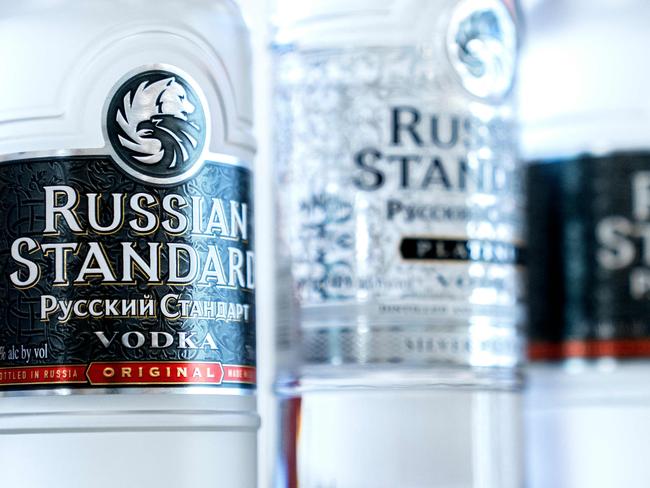
The government has also taken further action to impose economic penalties on Russia, supported by Belarus, by on Thursday applying an additional tariff of 35 per cent to all imports from the two aggressors. It will take effect from April 25.
Mr Morrison said Australia would continue to work with international partners to “impose the maximum costs” on Moscow through targeted sanctions on individuals and entities, the prohibition of energy, oil and gas products from Russia, and a ban on exports of alumina and aluminium ores to Russia.
More than 500 individuals and entities have been listed to date.
The sanctions on Russia make up the largest ever imposition of sanctions by Australia against any single country.
Mr Zelenskyy’s appeal comes at a delicate point in the war as Russia’s foreign minister Sergei Lavrov on Wednesday travelled to China for meetings with the China foreign minister Wang Yi, promising a “multipolar, just and democratic world order” after an overhaul of international relations.
The leader suggested Moscow and Beijing join efforts as the world faced “a very grave stage’’ in the history of international relations.
SHOCK RUSSIAN NUKE MOVE
Russian bombers armed with nuclear warheads reportedly entered European Union air space before being intercepted by fighter jets.
Swedish media reports four of Vladimir Putin’s warplanes swooped in over the Baltic towards the island of Gotland.
TV4, Expressen and Aftonbladet all report the formation was two Sukhoi Su-24 bombers and two Sukhoi Su-27 fighters.
The bombers — as seen in the photos with the single stabiliser tails — were the ones reportedly armed with the nukes.
The warplanes took off from a Russian air base in the enclave of Kaliningrad on March 2.
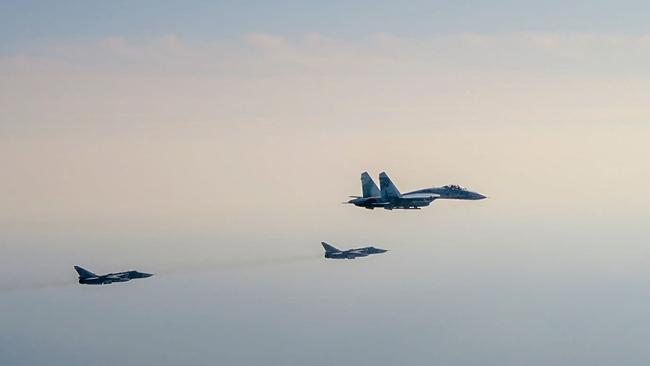
And while Sweden confirmed the intrusion into its air space had occurred earlier this month, the revelation that Russia’s bombers were armed with nukes has only emerged now.
Sweden responded to the intrusion by deploying two JAS-39 Gripen jets to intercept them.
The nation’s military officials concluded the bombers were armed with nuclear warheads after examining images of them.
“We assess it as a conscious action. Which is very serious, especially as Russia is a warring country,” Air Force Chief Carl-Johan Edstrom said.
“I cannot rule out incorrect navigation, but everything indicates that it was a deliberate act. They violated Sweden’s borders.”
The incident occurred a day after Putin suggested Sweden and Finland could face military action from Russia if they joined NATO.
It also came just after Sweden pledged to send military aid, including 5000 anti-tank weapons to the Ukraine. It was the first time since 1939 that Sweden had sent weapons to any country at war.
RUSSIAN TROOPS LEAVING CHERNOBYL
US defence officials said Russian forces had begun to pull out of the defunct Chernobyl nuclear power site.
Troops seized control of the Chernobyl site – where radioactive waste is still stored – on February 24, the first day of the invasion.
“Chernobyl is (an) area where they are beginning to reposition some of their troops – leaving, walking away from the Chernobyl facility and moving into Belarus,” the US official said.
“We think that they are leaving, I can’t tell you that they’re all gone.”
Russian troops also captured Europe’s largest nuclear plant at Zaporizhzhia on March 4, sparking alarm when shelling caused a fire at a training facility.
UN atomic watchdog chief Rafael Grossi visited the separate South Ukraine Nuclear Power Plant on Wednesday on his first trip to the country since Russia’s invasion raised fears of a nuclear accident.
Grossi has repeatedly warned of the dangers of the conflict — the first in a country with a vast nuclear estate.
Ukraine has 15 reactors at four active nuclear power plants, as well as stores of nuclear waste, including at Chernobyl – the site of the world’s worst nuclear disaster in 1986.
BIDEN, ZELENSKYY SPEAK FOR FIRST TIME IN WEEKS
US President Joe Biden and President Volodymyr Zelenskyy discussed “additional capabilities” to help the Ukrainian military, during a telephone call on Wednesday, the White House said in a statement.
Mr Biden also told Mr Zelenskyy that the United States would provide the Ukrainian government with $500 million in direct aid, as Kyiv battles against invading Russian forces.
“The leaders discussed … continued efforts by the United States with allies and partners to identify additional capabilities to help the Ukrainian military defend its country,” the White House’s readout of the two leaders’ conversation said.
The two leaders also “discussed how the United States is working around the clock to fulfil the main security assistance requests by Ukraine” in what marked the first disclosed solo call between Biden and Zelenskyy since March 11, the NY Post reports.
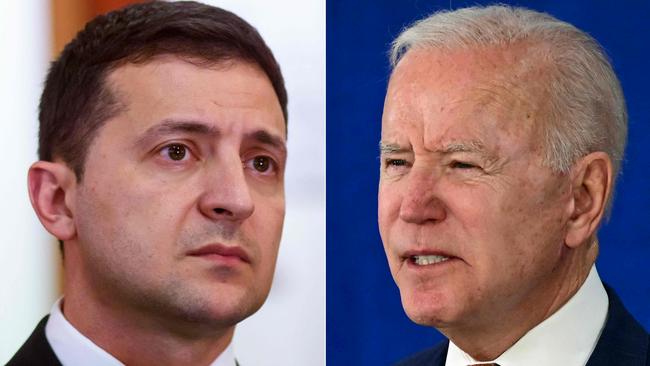
The readout didn’t mention Zelenskyy’s request for 28 Soviet designed MiG-29 fighter jets offered by Poland, which Mr Biden previously spiked, saying that such a transfer could cause World War III — a stance that outraged Mr Zelenskyy and sparked bipartisan backlash in Congress.
Instead, Mr Biden sought to underscore the military assistance the US has been willing to provide and “the critical effects those weapons have had on the conflict”, according to the White House.
Some 20,000 people are believed to have been killed since the Russian invasion began on February 24, according to Mr Zelenskyy, though the number of casualties could not be independently verified.
“Just finished an hour-long conversation,” Ukraine’s leader tweeted after the call.
“Shared assessment of the situation on the battlefield and at the negotiating table.
“Talked about specific defensive support, a new package of enhanced sanctions, macro-financial and humanitarian aid.”
Ukraine and Western powers have cast doubt on Russia’s pledge to reduce military activity around Chernigiv and the capital Kyiv, made during face-to-face talks in Istanbul on Tuesday.
Just finished an hour-long conversation with @POTUS. Shared assessment of the situation on the battlefield and at the negotiating table. Talked about specific defensive support, a new package of enhanced sanctions, macro-financial and humanitarian aid.
— Володимир ЗеленÑький (@ZelenskyyUa) March 30, 2022
“Chernigiv was shelled all night,” regional governor Vyacheslav Chaus wrote on social media.
There were also reports that frequent explosions could be heard coming from the direction of the suburban town of Irpin to the northwest of Kyiv.
Oleksandr Motuzyanyk, a spokesman for the Ukrainian defence ministry, said in a video statement that there had been “a certain partial movement of individual units from the Kyiv direction, as well as from the Chernigiv direction”.
But he added: “We do not observe the mass removal of Russian troops from these areas”.
Russian officials had pledged to “radically” reduce their attacks because of progress in negotiations on “the neutrality and non-nuclear status” of Ukraine – two central concerns for Moscow.
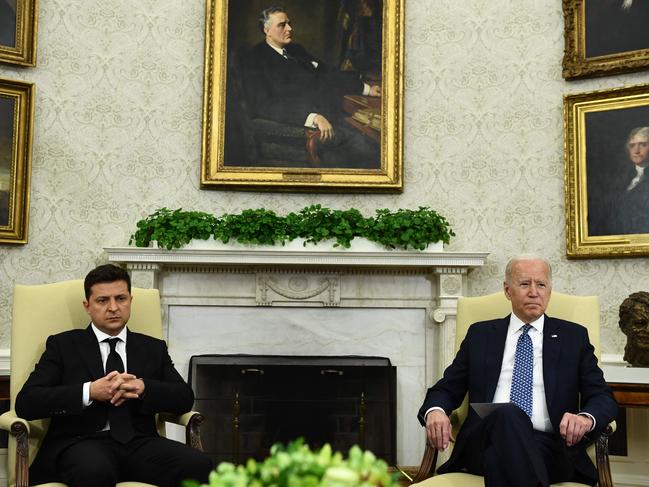
Both sides called the Istanbul meeting “meaningful” and “positive”, but the Kremlin on Wednesday played down hopes of a breakthrough.
“We cannot state that there was anything too promising or any breakthroughs,” Kremlin spokesman Dmitry Peskov told reporters.
“There is a lot of work to be done,” Mr Peskov said.
Stock markets, which had been buoyed by the more hopeful comments on Tuesday, slid again and oil prices rose back up on supply concerns.
The Pentagon said Russia had merely repositioned a “small number” of forces near Kyiv, and could be preparing a “major offensive” elsewhere.
The “vast majority” of Russian forces around Kyiv remained in place, said Pentagon spokesman John Kirby.
Still, the talks in Istanbul marked the first sign of progress in discussions to end the conflict, with a Kyiv negotiator saying there were “sufficient” conditions for the Ukrainian President to meet his Russian counterpart.
Originally published as Ukraine-Russia war: Ukraine accused of attack on Russian soil ’




